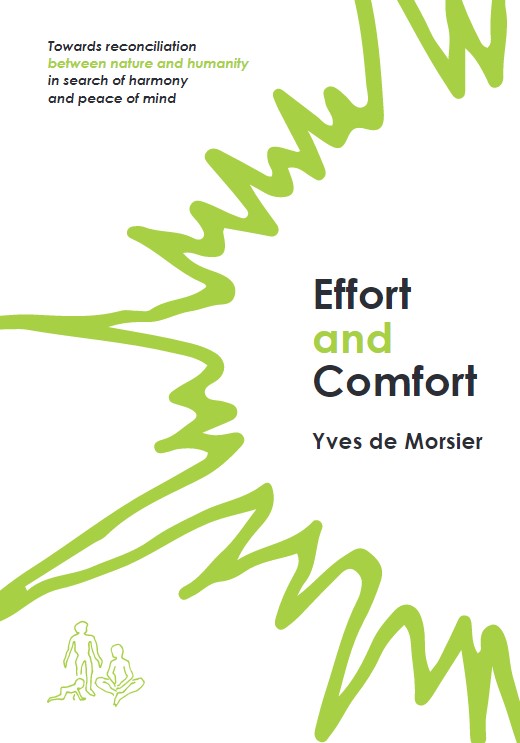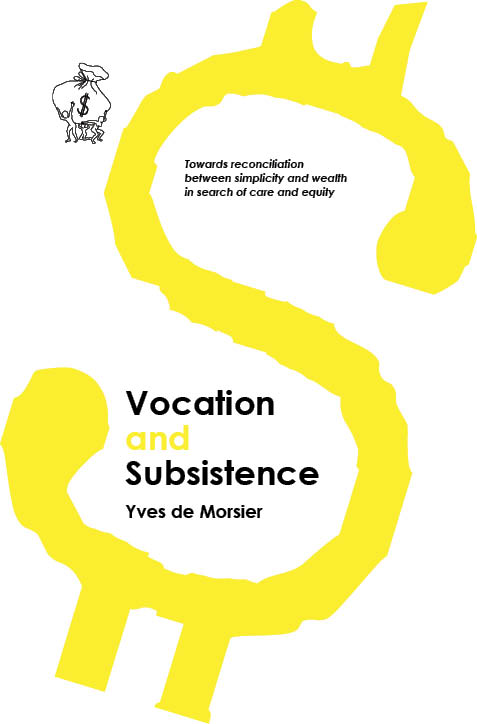PAPERBACK
The solution is simple … but demanding
A strategy for change-
A search for meaning: for a creative response to climate change, economic inequity and democratic collapse
This book presents a fundamentally new and different approach to the problem: climate change, the growing gap between rich and poor, the slow decay of our democracy, etc. … these are symptoms of a deeper crisis – one which cannot be fixed by technical measures.
It is all about life and the meaning of life. We cannot wait for our leaders to act. Nobody else will do it for us! As ordinary people, citizens, workers, consumers, we have to empower ourselves; we are the main and only agents who can truly initiate the move towards change.
The solution is simple: it is in our hands. In our daily lives we have all the necessary means to create, locally, the basic conditions for ourselves to thrive – and to put pressure on our leaders to follow us.
But it is also demanding: we have to learn to think differently and invent and practise new ways to work, exchange, share and live together; we have to discover a new practice of freedom, inclusiveness and solidarity-mutuality.
This book reinvents practical ways of living. It proposes a concrete strategy for change, in 40 points, how to do this here and now.
It is also a guide to the search for meaning, because the change of mentality that is urgently needed can only arise from a better and deeper understanding of the meaning of life and of the laws of the universe.
ISBN 978-1-922890-48-1
PAPERBACK
Effort and Comfort
Towards reconciliation between nature and humanity in search of harmony and peace of mind
The crisis in our relationship with our natural environment is much more than a problem of excess of CO².
Climate change, collapse of ecosystems, loss of biodiversity: these many signs of decay are drastic symptoms that call for a deep transformation in the way we live together and a reassessment of our priorities.
This book proposes a new approach to our relationship with nature and the universe that goes beyond conventional ecology as a prescription for managing natural resources. Humankind is not an exception presiding over the rest of Creation that it may exploit at will. No, we belong to nature, to the land. In this belonging lies the solution to our crisis.
First, this manifesto examines the pathology in our relationships with nature and each other: It describes 4 major ways we use to escape from:
• our confrontation with nature, namely through
• denial by violence (mobility, speed, virtuality)
• destruction by domination (energy, technology)
• accumulation by exploitation
(extraction, inequality)
• and uprooting by isolation (market
economy, advertising disconnection)
Then it shows how we can find the solutions, both practical and metaphysical.
While the universe is aiming at greater differentiation, subjectivity, communion and depth, our society does exactly the opposite: it aims at standardisation, indifference, competition and materialism. It is why we can find all the solutions we need in nature. When we allow nature to become our teacher of righteousness, we only need to listen and adapt to her.
ISBN 978-1-923265-24-0
PAPERBACK
Recessive and Dominant
Towards reconciliation between femininity and masculinity in search of a new anthropology.
This book is different from other studies that talk about gender. It will go far beyond the gender issue, delving into the deeper meaning of what femininity and masculinity mean as qualities.
It will illustrate how our personal aptitudes and attitudes are often linked with our gender. Not because we are defined by our gender but because the experience of our gender provides us with special skills and qualities. For instance, the ability to give birth fosters in women a special disposition for being caring and compassionate. Motherhood nourishes aptitudes for listening, dialogue and peace. This represents a potential our gender offers us rather than a constraint it forces upon us.
This predisposition is the path to freedom because it is not deterministic. Men can be tender. Women can be strong. A whole range of attitudes is open to each of us. We must learn the freedom of spirit to follow this inestimable potential and to express it in the way that suits us best. Gender is then more a potential than a constraint.
Femininity and masculinity urgently need to be rediscovered as qualities that can mix and combine endlessly, creating in this way a richer range of opportunities. The number of combinations is infinite.
We should rather talk in terms of Yin and Yang, as the two poles that influence our lives, no longer so narrowly linked with gender. It remains our responsibility to choose which qualities we will nurture and which ones we will oppose. Out of these many choices ensues the quality of our life and of the world we live in. All attitudes are not equal. Some foster compassion and life, while others foster hatred, violence and destruction.
Finally, the most precious qualities in life need to be protected if we want them to thrive. Compassion, care, listening, dialogue and inclusiveness can only develop if we are committed to providing the right conditions for them to flourish. Because their quality is fragile, they are said to be RECESSIVE, while the antagonistic forces are said to be DOMINANT (like genes in biology). This understanding traces a new path of liberation from false representations. Whether women or men, we all become free to act in a creative way.
ISBN 978-1-922957-71-9
PAPERBACK
Vocation and Subsistence
Towards reconciliation between simplicity and wealth in search of care and equity
So far, as a market society, we have got it all wrong – the role of the economy is not to organise infinite growth on a limited planet, nor is to generate wealth that is accumulated in the hands of a few. No, it is to satisfy the most important human needs for all, from food and shelter to health, education, creativity, social recognition and love.
This book adopts a radically different approach to the economy. Instead of accepting the dominance of finance and capital, it goes back to the basics – what are the true nature, meaning and function of resources, of work, of the Commons, of knowledge, of infrastructure, of capital in our human lives – especially if we intend, in our personal lives, to focus on what matters most.
The first part of the book investigates the disease of our system: how the influence of market and money has inverted most of our human priorities, favouring competition and profit at the expense of care and sharing.
Then it proposes solutions: how we should transform our behaviours; how local communities need to take back control of the conditions for their own production and exchanges; how reciprocity may become the key factor that will initiate exchanges of a fundamentally different nature; how our human values and persons may be better recognised and reinforced; how exchanges become, then, opportunities for social links; how precious qualities (goods) may take shape, find their own expression and be shared, and how they may multiply precisely because they are shared.
True wealth is not like a cake one gets less of when many people share it – on the contrary, an equitable way of sharing common wealth makes it accessible to many more, accessible to all people. And, in this way, it circulates more quickly and extends more widely.
ISBN 978-1-923333-95-6
PAPERBACK
Circular and Linear
Towards reconciliation between between South and North in search of an end to white supremacy
This book is different from other books about colonialism, racism and white supremacy. It does not repeat the facts that other books have exposed so well. Rather, it examines the cultural and human triggers of domination and contempt for others. It plunges into their causes, which reside in the deep heart-mind of humankind.
It dares to look into the way we function as people in order to identify the mechanisms that foster our instinctual reactions when we meet “the Other”. Our reactions may indeed be very powerful and difficult to control.
It will show how the North and the South think in different terms – the North in rational and linear ways; the South in cultural and circular ways (hence the title of this book).
It will redefine some essential concepts that lie at the base of colonialism and white supremacy. It will investigate the meaning of culture and civilisation, race, identity, whiteness, otherness, truth, primitiveness, development, evolution, domination, enmity, conflict and (re)conciliation.
This book will demonstrate the importance of choice. It will illustrate the path of personal and collective choices that lie at the root of all forms of freedom. It is because of the wide and rich range of possible choices that cultures are so diverse. It will examine the inner and intimate personal space in which we make these essential decisions that orientate our lives: it is called the hidden sphere.
Finally, it will examine the path of true liberation, against the diverse forms and tools of neo-colonialism; how the struggle for independence is configured; and what the functions of violence, of ideology, even of terrorism may be.
Each chapter will try to open and defi ne this new path of liberation for all of us, because supremacy destroys us all. It is time we find other ways to relate and to practise true dialogue (i.e. true ways of peace and harmony). We need, all of us, to liberate ourselves.
About the Author
Yves de Morsier, architect by training, proposes here a very practical approach that draws from about 50 years of experience in forms of gentle development that aim at a fair share of common resources. He lives on the South Coast of New South Wales (Australia) where, with his wife Ursula, he has built an off-grid solar-powered rammed earth house, facing a national park, where they experiment with new ways of sharing and facilitate times of meditation and workshops.






